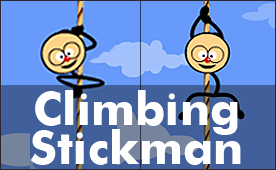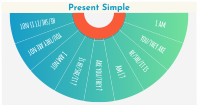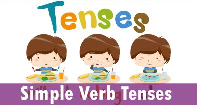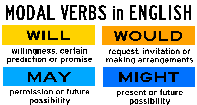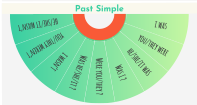Change Avatar
Simple Past Tense
Simple Past Tense
What is a verb tense?
A verb tense tells us when the action happened - an action or past state of being (i.e. a to be verb).
There are 3 simple verb tenses we are going to learn about:
#1 - Present tense means something that is happening NOW!
#2 - Past tense means that something already happened.
#3 - Future tense means something is going to happen in the future.
HINT! What’s a to be verb? Here’s a reminder:

What is Simple Past Tense?

Past tense means something that already happened or a past state of being.
How do you make a verb past tense?
For most verbs, you add the ending -ED.
| Present tense | Past Tense |
|---|---|
| I walk to school. | I walked to school. |
| You jump rope. | You jumped rope yesterday. |
| He picks up the cat. | He picked up the cat. |
How do you form the Simple Past Tense?
In general, you just add -ED to the root word to form the simple past tense.
Note: If the root word already ends in -E, then just add -D.
The exception to that is when you’re in the 3rd person singular (he, she, it), which is when you add -s to the end of the root word.
Here is a chart that helps you see the different person formats for different root words:
WALK
| Singular | Plural | |||
|---|---|---|---|---|
| 1st Person | I | walked | we | walked |
| 2nd Person | you | walked | you (all) | walked |
| 3rd Person | he / she / it | walked | they | walked |
CLEAN
| Singular | Plural | |||
|---|---|---|---|---|
| 1st Person | I | cleaned | we | cleaned |
| 2nd Person | you | cleaned | you (all) | cleaned |
| 3rd Person | he / she / it | cleaned | they | cleaned |
HATE
| Singular | Plural | |||
|---|---|---|---|---|
| 1st Person | I | hated | we | hated |
| 2nd Person | you | hated | you (all) | hated |
| 3rd Person | he / she / it | hated | they | hated |
Are there exceptions to that rule?
Yes! Sometimes the simple past tense of an irregular verb looks exactly like the root form, so you just use that.
Here’s a list of the most common words where the root word is the same as the simple past tense:
| bet | burst | cost | cut | fit |
| hit | let | put | quit | read |
| set | shut | split | spread |
Sometimes the word has an irregular past tense, and you just have to know it. Here’s an example of the most commonly used ones:
IRREGULAR SIMPLE PAST TENSE
| SIMPLE PRESENT | SIMPLE PAST | SIMPLE PRESENT | SIMPLE PAST |
|---|---|---|---|
| be | was/were | mean | meant |
| become | became | meet | met |
| begin | began | pay | paid |
| bite | bit | ride | rode |
| bleed | bled | ring | rang |
| blow | blew | rise | rose |
| bring | brought | run | ran |
| build | built | say | said |
| catch | caught | see | saw |
| choose | chose | sell | sold |
| come | came | send | sent |
| deal | dealt | shake | shook |
| dig | dug | shine | shone |
| do | did | shoot | shot |
| draw | drew | sing | sang |
| drive | drove | sink | sank |
| eat | ate | sit | sat |
| fall | fell | sleep | slept |
| feed | fed | slide | slid |
| feel | felt | speak | spoke |
| fight | fought | speed | sped |
| find | found | spend | spent |
| fly | flew | spin | spun |
| forget | forgot | stand | stood |
| forgive | forgave | steal | stole |
| freeze | froze | stick | stuck |
| get | got | sting | stung |
| give | gave | strike | struck |
| go | went | sweep | swept |
| grow | grew | swim | swam |
| hang | hunt | swing | swung |
| hear | heard | take | took |
| hide | hid | teach | taught |
| hold | held | tear | tore |
| keep | kept | tell | told |
| know | knew | think | thought |
| lead | led | throw | threw |
| leave | left | understand | understood |
| lend | lent | wake | woke |
| light | lit | wear | wore |
| lose | lost | win | won |
| make | made | write | wrote |
How do you make the Simple Present Negative?
To make the simple past negative, you use:
DID + NOT + root form of verb
Examples - You didn’t go to school when you were sick.
It didn’t seem like we would win.
DIDN’T + root form of verb
Examples - She didn’t like to sleep when she was a baby.
I didn’t care for vanilla ice cream until I put sprinkles on it.
To make to be verb (see above) negative, it’s a bit more complicated - it depends on the subject of the sentence.
If the subject is SINGULAR use WAS NOT or WASN’T
Examples - I was not going to the museum.
He wasn’t tired even after the long day.
If the subject is PLURAL use WERE NOT or WEREN’T
Examples - We were not doing our homework.
We weren’t ready to leave the pool.
How do you ask a question in the simple perfect tense?
It’s easy! Just use:
DID + subject (noun or pronoun) + root form of verb
Examples - Did you take the trash out to the curb?
What did you say when you saw the bear?
When asking questions with a TO BE verb, however, the formula is:
WAS/WERE + subject
Examples - When was I supposed to be there?
I Were we going to visit the puppies at the pound?




